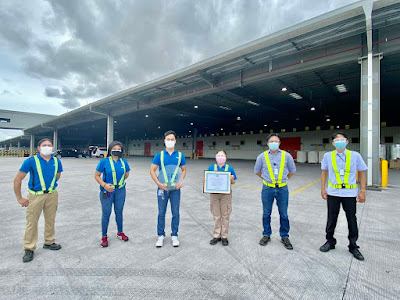Procter & Gamble Philippines' new Distribution Center Expansion project attains Silver LEED certification
Procter & Gamble Philippines (P&G) was recently awarded a Silver LEED certification for its new Distribution Center Expansion project in the P&G Cabuyao manufacturing plant.
The LEED certification is just the latest recognition of P&G’s continuous sustainability efforts that are making a positive, meaningful impact in the areas of climate, waste, and water.
P&G’s Cabuyao Plant operations is optimized to minimize its impact on the environment. For example, it is powered by 100% renewable electricity. Alongside P&G plants around the world, P&G Cabuyao is also a zero-manufacturing waste to landfill plant.
Moreover, Procter & Gamble Philippines is committed to creating smarter packaging solutions to stop waste from ending up in nature. It eliminated plastic overwraps on Safeguard 3-pid packs. It started using recycled plastic in the packaging of Herbal Essences bio: renew, which is made from 25% post-consumer resin. Together with World Vision, P&G also recovered and upcycled over 3 million sachet waste and upcycled it into school chairs for public schools.
Visit us.pg.com/environmental-sustainability/ for more information.
“We are proud to accept the Silver LEED certification for our new Distribution Center Expansion project in the Cabuyao plant. We will continue to make sustainable investments that help P&G be a Force for Good and a Force for Growth in the country,” says JP Lotuaco, P&G Cabuyao Plant Engineering and Sustainability Leader.
The LEED certification is just the latest recognition of P&G’s continuous sustainability efforts that are making a positive, meaningful impact in the areas of climate, waste, and water.
P&G’s Cabuyao Plant operations is optimized to minimize its impact on the environment. For example, it is powered by 100% renewable electricity. Alongside P&G plants around the world, P&G Cabuyao is also a zero-manufacturing waste to landfill plant.
Moreover, Procter & Gamble Philippines is committed to creating smarter packaging solutions to stop waste from ending up in nature. It eliminated plastic overwraps on Safeguard 3-pid packs. It started using recycled plastic in the packaging of Herbal Essences bio: renew, which is made from 25% post-consumer resin. Together with World Vision, P&G also recovered and upcycled over 3 million sachet waste and upcycled it into school chairs for public schools.
Visit us.pg.com/environmental-sustainability/ for more information.

Comments
Post a Comment